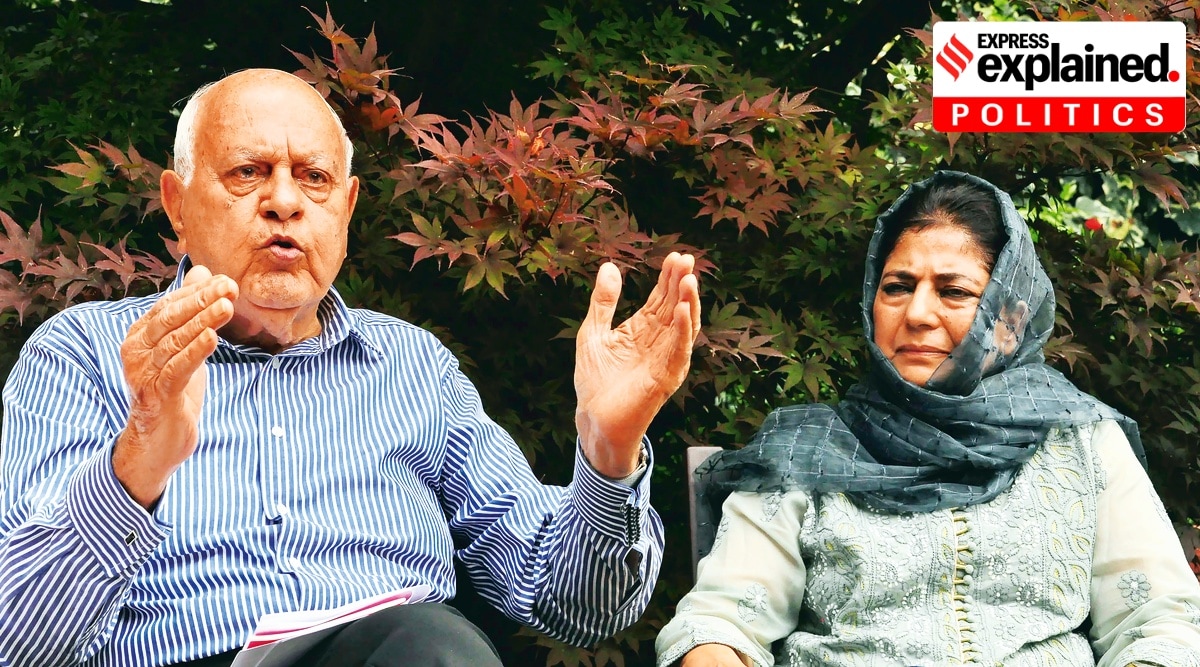© The Indian Express Pvt Ltd
Latest Comment
Post Comment
Read Comments
 Traditional rivals Farooq Abdullah and Mehbooba Mufti have joined hands. (File)
Traditional rivals Farooq Abdullah and Mehbooba Mufti have joined hands. (File) From the establishment of all three tiers of Panchayati Raj institutions to the reservation of seats for Scheduled Tribes (STs) during the delimitation of Assembly constituencies, from a change in domicile laws to enable people from elsewhere in the country to settle in Jammu & Kashmir, and from political arch-rivals becoming friends and friends becoming rivals — the Union Territory has witnessed many firsts in the past four years after the abrogation of Article 370 on August 5-6, 2019.
Elections were held for District Development Councils (DDCs) in all 20 districts of J&K between November 28 and December 19, 2020, raising hopes for a democratic process at the grassroots.
DDCs in J&K were earlier called District Planning and Development Boards, with members who were nominated by the state government. DDCs work at the district level to formulate periodic and annual plans for development works. The additional district development commissioner is the chief executive officer of the DDC.
However, DDC chairpersons at several places have complained that even with the elected members, in most cases the development plans are prepared by officials, and placed before them only for vetting. Some chairpersons alleged their monthly honorariums too were delayed.
Almost all major opposition leaders were either detained or had their movements curtailed after the abrogation of Article 370. With political actions by mainstream parties frozen, new outfits emerged, and several leaders changed loyalties.
The PDP was the worst hit — with its president Mehbooba Mufti under preventive detention, many of its senior leaders deserted the party. Former minister Altaf Bukhari and some other senior PDP leaders floated the J&K Apni Party in 2020.
In the face of persistent BJP efforts to dismantle the traditional politics of Kashmir, sworn political rivals National Conference and PDP joined hands in 2020, along with several other opposition parties, under the banner of the People’s Alliance for Gupkar Declaration (PAGD).
The PAGD fielded consensus candidates in the DDC polls, winning 112 seats, followed by the BJP (75), Independents (50), Congress (26), Apni Party (12), PDF and National Panthers Party (2 each), and the BSP (1). After the People’s Conference left the PAGD in 2021, its tally fell to 102.
In 2022, former Congress leader Ghulam Nabi Azad floated the Jammu and Kashmir Progressive Azad Democratic Party (JKPADP).
The Centre constituted a three-member Delimitation Commission headed by retired Supreme Court judge Justice Ranjana Desai on March 6, 2020, to carve out 90 Assembly constituencies, including reserved ones for SCs and STs. In its final report in 2022, the commission increased the number of Assembly seats in the Jammu division from 37 to 43 and in Kashmir from 46 to 47. It also recommended the reservation of 9 constituencies for STs, 6 for SCs, and a provision for the nomination of two Kashmiri Hindus and a displaced person from PoK.
The successful conduct of the DDC elections and completion of the delimitation exercise led to speculation about early Assembly elections — which was strengthened by repeated calls by senior BJP leaders to workers in the UT to begin preparations. Officials, however, say there is very little chance of elections being held before next year’s Lok Sabha polls.
Meanwhile, the Centre has tabled legislation in Lok Sabha seeking to include four new groups in the state’s ST list — which has triggered widespread demonstrations from the Gujjars and Bakerwals, the dominant ST groups in the UT, which see this as potentially diluting their political empowerment.
On Tuesday, Gujjar-Bakerwal protesters heckled a senior leader of the J&K BJP’s minority morcha, and plan to hold rallies in Jammu and Rajouri on August 6 and 7 respectively. Meanwhile, the Paharis, one of the intended beneficiary groups in the ST Bill, plan to take out marches in support of the legislation.